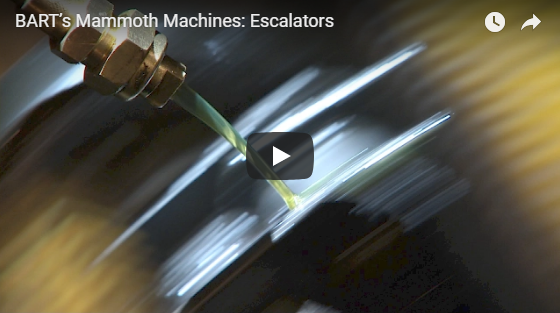*Click the station name for accessible alternatives for each station elevator
The official BART app also offers escalator status updates.
Escalators may be out of service for the following reasons
Evaluating
The process of opening up an escalator and determining the extent of repairs needed to safely return the unit to service. After the evaluation, repair plans will be put in place factoring in needed parts, resources and impact to system.
Major Repair
Maintenance that will need immediate attention and will require significant down time is considered a major repair. This type of work is usually discovered by a significant failure or routine maintenance check.
Modernization
These outages are for life cycle renovation of equipment to prolong an escalator’s State of Good Repair. Modernizations are performed to improve reliability, upgrade systems to current code and to meet modern safety regulations. A full Modernization project typically requires 24 weeks on average to accomplish due to the required precise fabrication of replacement components; as well as, the specialized equipment and rigging needed to remove and install extremely large components in often arduous locations. A modernized 40’ rise escalator is comprised of over 12,000 moving parts. Asset age, size, station location and surroundings generally determine if a modernization is selected in lieu of new replacement. A new replacement can often cost substantially more than a modernization due to the increased construction cost associated with removing large facility structural members or redesigning of a station to accommodate a new building code or increased group level rating in newly manufactured conveyances. Escalators should be modernized every 20-25 years and replaced after 40-50 years.
Planned Maintenance
Accomplishing identified maintenance that is required and planned at a time that will cause the least amount of impact to the system and patrons. Items have been identified and need to be corrected but will start when all parts, equipment and manpower is available to accomplish repairs with the intent to have minimal down time of the unit.
Preventative Maintenance
Monthly planned maintenance to accomplish routine tasks, items such as lubing components and servicing oil in gearboxes. Preventative Maintenance checks are accomplish during non-commute periods and unless a major issue is identified return to service the same day. These monthly tasks help the reliability of the units and identify issues in order to schedule maintenance that will limit disruption to the patrons.
Repair
Maintenance that will require out of service time to accomplish. This type of repair will normally take less time than a major repair to accomplish and return the unit back to service. Based on the scope of work, the repair work will be accomplished during non-peak hours to minimize service disruptions.
Safety Inspection
State codes mandate annual inspections accomplished on all escalators to assure that units are operating safely. If discrepancies are discovered during these inspections the units are immediately taken out service until repairs are completed. A safety inspection is conducted by a state licensed technician on any unit that is involved in a patron incident. A unit involved in such an incident will have a safety inspection and any identified repairs completed before it is returned to revenue service.
Scheduled Support
Escalator taken out of service to support other maintenance activity in the station. Examples include repairs to station lighting and platform tiles.
Complexities of Securing and Repairing Parts
BART maintains a significant amount of on-hand inventory (1014 items to be exact) and we monitor the inventory balances routinely. But we face many challenges when it comes to securing and repairing parts. That's because escalators at BART are made by 8 different manufacturers, some of which have gone out of business. Components and parts are obsolete requiring crews to search for suitable or compatible replacement parts, or reverse engineer the parts.
Major components in our escalators and elevators such as gearbox, motors, track, carriages, sprockets, bearings, bullgears, elevator doors / door operators, hydraulic cylinders are not inventoried because they are one of kind built specifically for a specific conveyance with precise technical specification. When these components fail, they are required to be removed, overhauled and reinstalled. These repairs go beyond routine maintenance and are classified as extensive heavy repairs. We are often caught having to wait for these fixes to arrive in the mail because they can not be inventoried or easily remain on stand by.
Older equipment with a high degree of ridership, operational hours, and environmental abuse like at BART end up exceeding their useful life. Measure RR funds now provide BART the money to begin to replace these old units.
Escalator Modernization Program
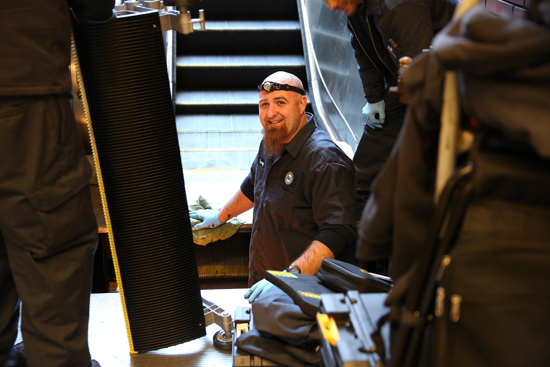
Systemwide, BART has 175 escalators, most of which have been in operation for over 40 years.
BART is in the beginning stages of the first major escalator overhaul in nearly 20 years. It involves units being renovated or replaced, beginning with the system's busiest stations.
Measure RR bond funds allow us to expand our escalator modernization program, focusing on escalators between Embarcadero and Civic Center Stations as the first phase. On March 14, 2019, The BART Board of Directors approved the single largest contract for escalator replacement in BART history. The $96.5 million contract for the Market Street Escalators Renovation Project will install and replace 41 escalators at Embarcadero, Montgomery, Powell and Civic Center Stations. Of the escalators to be replaced, 22 are street to concourse level and 18 connect concourse with station platforms. Additionally, a street level escalator at Civic Center Station will be relocated to the entrance closest to the Orpheum Theatre which currently has only stairs. We anticipate replacing six escalators each year.
Phase Two of the Measure RR funded escalator overhaul program will involve 38 escalators at downtown Oakland's 12th St. and 19th St. Stations, and at San Francisco's 16th/Mission St. and 24th/Mission St. Stations. Future phases will involve the remaining 96 escalators.
We understand the major disruption caused by our escalators being taken out of service, but please understand these units have been heavily used for decades for up to 20 hours a day year round. The wear and tear necessitates that they be upgraded and replaced.
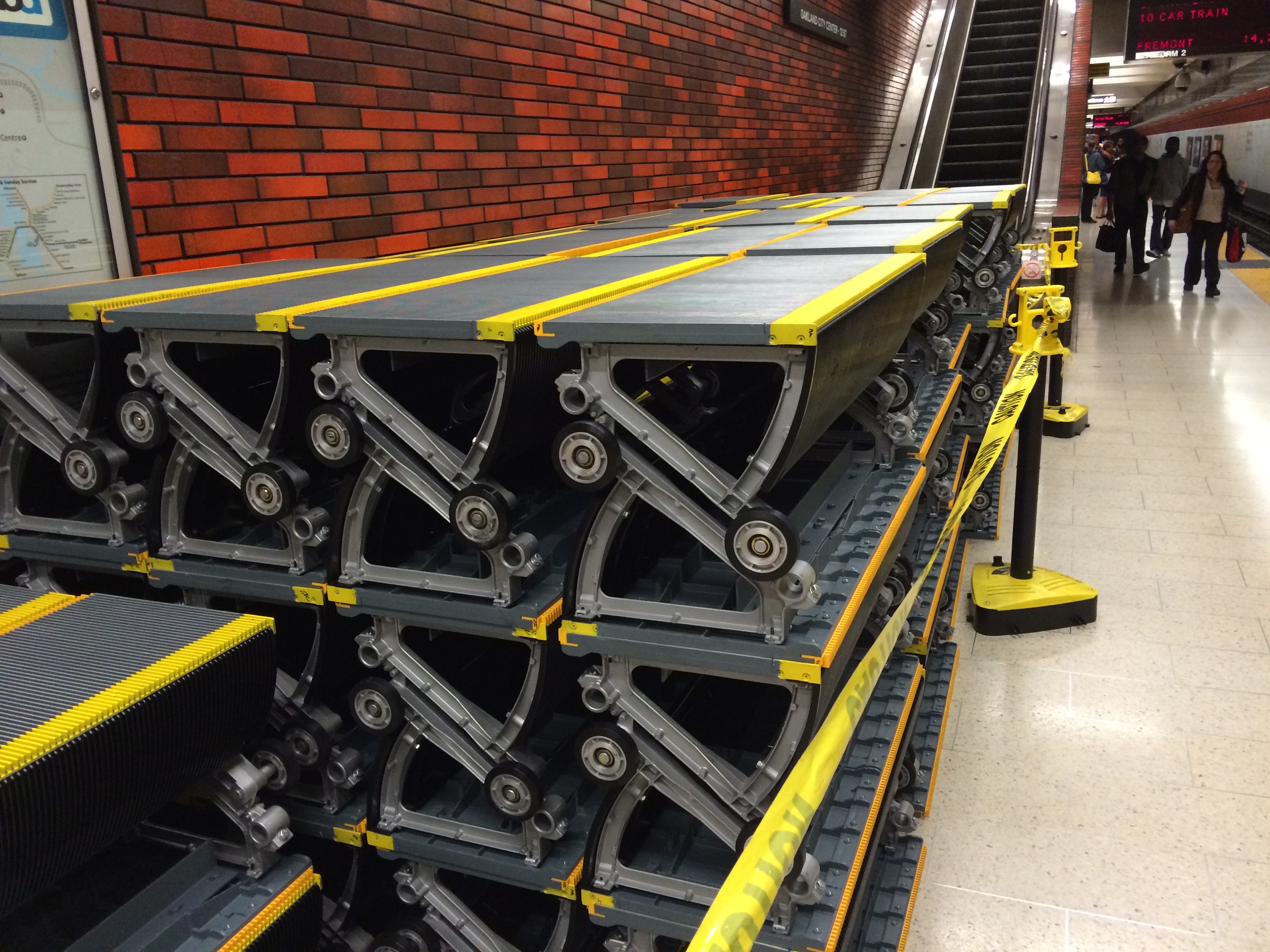
Protective Canopy Project
The Escalator Modernization Program is taking place in conjunction with the construction of 22 Measure RR funded protective canopies over street level entrances for the Embarcadero, Montgomery, Powell and Civic Center Stations. On January 23, 2020, the BART Board of Directors approved a contract to build 22 canopies above all street-level entrances at the four stations. BART anticipates building six canopies per year.
Two pilot canopies (one at Powell Station and one at Civic Center Station) opened in Fall 2018. The canopies are a state code requirement for new escalator investments.
View the project page for full details.
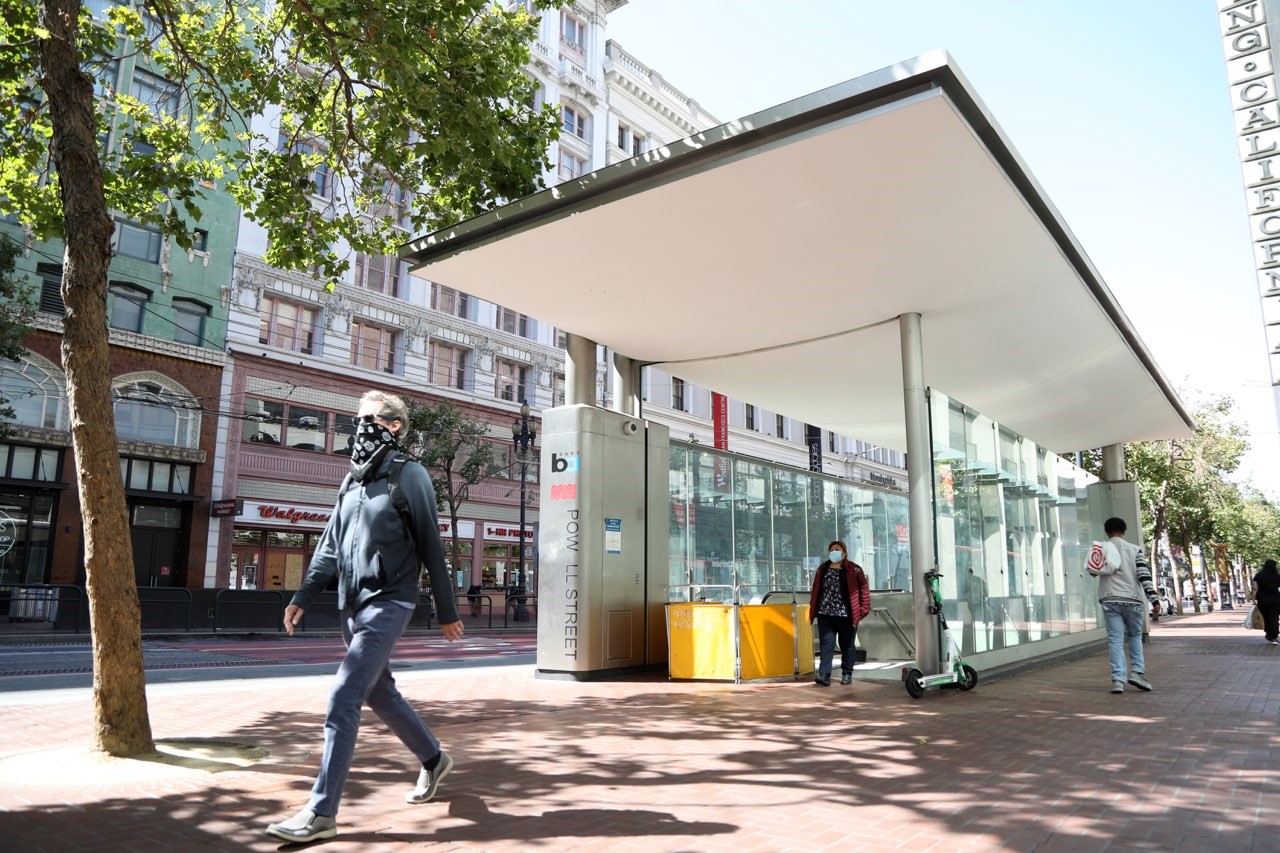
They will not only protect the new escalators from the wear-and-tear of elements like rain and wind-swept debris, but they will provide an added layer of station security and cleanliness through motorized gates that allow the entrances to be locked at street level when stations are closed.
We have learned from the 19th St. Station Canopy Project in Oakland, completed in 2015, that the added protection has reduced escalator down time by about 30%, so significant improvement is anticipated for escalator performance in downtown San Francisco when the Canopy/Escalator Replacement Project are completed. All of the canopies are scheduled to be up by 2025.
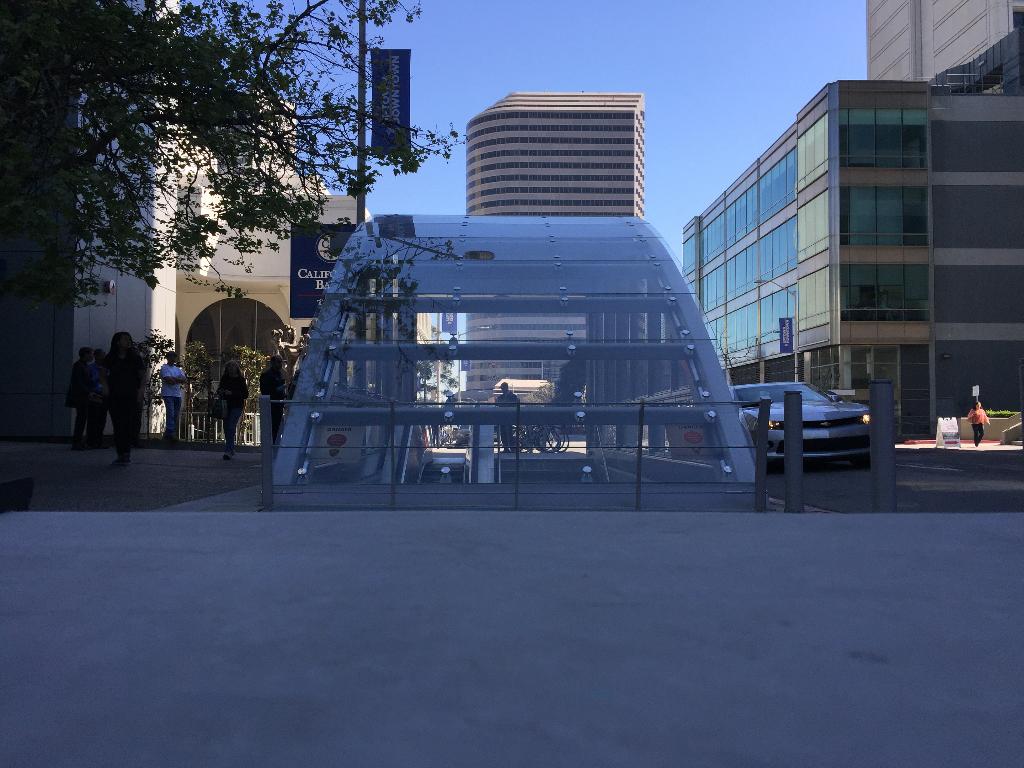
Remote Monitoring System
New technology is also being put into place that will result in quicker and more efficient repairs. The BART Board in December 2018 awarded a contract to install a Remote Monitoring System on 83 elevator and escalator units at six of the busiest stations. The remote monitoring system is expected to minimize downtime for elevators and escalators by providing technicians -- and the public -- with real-time information when a unit has a problem.
In some cases this system may even be able to send crews a self-diagnosis of what the issue is, so they can send the right technicians with the right tools and parts to get a unit back up and running on the same trip.
BART is designing the remote monitoring pilot program to make it easily expandable to the entire system. The pilot will start with 83 high-use units at Embarcadero, Montgomery Street, Powell Street, Civic Center, 12th St./Oakland and 19th St./Oakland.
More Information
Read the detailed presentation given to the BART Board of Directors in November 2017 highlighting our escalator and canopy program.
Watch this video that shows what it takes to fix the BART escalators used by tens of thousands of people every day:
Escalator Technicians Wanted
BART is currently hiring for elevator and escalator techs. www.bart.gov/jobs
A Certified Competent Conveyance Mechanic license is required to work on units, and with only a small pool of certified techs, competition with the private industry is high. Much of the skilled labor force in this area are retiring baby boomers and therefore there is a need to train the future generation of elevator and escalator techs to help keep the Bay Area moving.
BART offers an apprenticeship program to help build an in-house pipeline of certified workers. It is dedicated for current SEIU employees working at BART. Another path to certification is to be hired as a non-licensed Maintenance Worker III with mechanical and electrical experience from a related industry and then BART will help with the process to take the certification test after three years in the industry.
